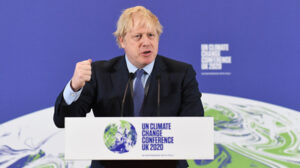
The UK government aims to ban the sale of new petrol and diesel cars, including hybrids, by 2035 under a revised strategy to tackle climate change that implements green policies five years earlier than originally planned.
Industry bodies have reacted with concern about the proposals, which are subject to consultation, with the Society of Motor Manufacturers and Traders labelling it a “date without a plan” that will destroy value in an emerging market for clean cars.
Fleet operators’ association ACFO, which represents fleet buyers who account for more than half the cars sold in the UK each year, said the announcement made it clear “politicians do not live in the real world”.
The British Vehicle Rental and Leasing Association, whose members own and operate more than five million cars, vans and trucks and buy nearly 50% of all new vehicles sold each year, urged the government to unveil a comprehensive electric vehicle support package in its forthcoming Budget to back its plans.
BVRLA chief executive Gerry Keaney said: “Budget 2020 is an opportunity to set the tone for a new decade in which the transition to decarbonised road transport will be won or lost.
“To achieve these goals the Government must provide a clear support package through to at least 2025. It must preserve the plug-in car and van grants, maintain a strong set of tax incentives and tackle the huge and often arbitrary costs associated with fleet charging infrastructure.”
The government originally intended to introduce a petrol and diesel ban from 2040, but has brought the date forward and included hybrids as it prepares to host the next UN climate conference, COP26, in Glasgow in November.
At a launch event in London, Prime Minister Boris Johnson (pictured) was joined by broadcaster Sir David Attenborough and Giuseppe Conte, the Italian prime minister.
Johnson said: “There can be no greater responsibility than protecting our planet. 2020 must be the year we turn the tide on global warming; it will be the year when we choose a cleaner, greener future for all.”
Transport Secretary Grant Shapps said the government has a £1.5 billion strategy to support the electric vehicle transition.
Industry concerns
Industry leaders raised concerns about the timing of the proposals, in a year when vehicle manufacturers launch dozens of hybrid vehicles that have cost billions of euros to develop.
Mike Hawes, chief executive of the SMMT, said: “Manufacturers are fully invested in a zero emissions future, with some 60 plug-in models now on the market and 34 more coming in 2020. However, with current demand for this still expensive technology still just a fraction of sales, it’s clear that accelerating an already very challenging ambition will take more than industry investment.
“This is about market transformation, yet we still don’t have clarity on the future of the plug-in car grant – the most significant driver of EV uptake – which ends in just 60 days’ time, while the UK’s charging network is still woefully inadequate.
“A date without a plan will merely destroy value today. So we therefore need to hear how government plans to fulfil its ambitions in a sustainable way, allows people from all income groups and regions to adapt and benefit, and, crucially, not undermine sales of today’s low emission technologies, including popular hybrids.”
Last year, 2.3 million vehicles were registered in the UK, of which 90% were petrol (65%) and diesel (25%).
Although demand for battery electric vehicles grew 144% in 2019, just 37,850 were sold, equivalent to 1.6% of the market, with hybrids accounting for nearly 200,000 registrations, or 8% of the market.
Caroline Sandall, ACFO chairman, said: “Simply advocating a ban on the sale of petrol, diesel and hybrid cars and vans is far too simplistic.
“It is clear politicians do not live in the real world – a world occupied by businesses employing fleet decision-makers that already typically operate the most technologically advanced and therefore the cleanest vehicles available.
“While demand is increasing, it is being hampered in part due to the right products not being available at the right price with realistic delivery times. Simply advocating a ban on the sale of internal combustion engine and plug-in hybrid models is not the answer.”
ACFO called for urgent government action to address the need for more charging points and provide certainty over grants for plug-in cars, while also offering long-term clarity on company car tax rates for clean vehicles.
It also said more support was needed for van and lorry fleets, which it says are struggling to find real-world workable alternatives to diesel.
There are fears that government policies will undermine market demand in a repeat of the ill-fated transition to liquefied petroleum gas in the 1990s, when orders collapsed after government grants were slashed.
Green ambitions
Despite the concerns, there is wide-ranging fleet industry support for cleaner transport, if transition is carefully managed.
The EV100, an initiative organised by The Climate Group, is targeting zero-emission transport by 2030.
Helen Clarkson, chief executive of The Climate Group, said: “Our business campaign for the 100% adoption of electric vehicles by 2030, has 62 corporate members, many of which are British, including AstraZeneca, BT, Centrica, Foxtons, Mitie, RBS, SSE and Unilever. Businesses are showing what is possible and The Climate Group would love to see this level of ambition matched.”
The world’s largest leasing company, LeasePlan, is also a member of the EV100.
Matthew Walters, head of consultancy at LeasePlan UK, said: “Though it’s a challenging ambition, it is one we are fully in support of. We must do all we can to get there as quickly as possible. There is still a way to go, but we are definitely moving in the right direction.”
He added that the government needs a robust plan to make the target achievable, including public education to counter misconceptions about the move to electric vehicles.
A spokesman for Toyota, the UK’s biggest provider of hybrid vehicles, said: “We believe a range of both low-emission and zero-emission technologies such as hybrid electric vehicles, plug-in hybrids, battery electric vehicles and hydrogen fuel cell electric vehicles will all be required to support this necessary transition.
“We continue to believe hybrid electric vehicles offer an important, affordable and practical low emission option to everyone today and for the coming years, as our own leading contribution to CO2 reduction across the UK and Europe clearly demonstrates to date.”
Green fleet growth
The government’s announcement comes amid a flurry of EV deals from fleet operators.
Jaguar Land Rover UK and Northumbria Healthcare NHS Foundation Trust is providing a fleet of 700 Jaguar I-Pace electric vehicles for public sector staff across the country.
Nissan and Uber have signed a deal for the Japanese manufacturer to provide the ride-hailing service with 2,000 UK-built electric Leaf models.
Parcel delivery giant UPS has also announced that it has completed a minority investment in UK-based electric vehicle manufacturer Arrival, which includes an order for 10,000 purpose-built electric vans.
Lex Autolease, the UK’s biggest leasing company, reported that it had received more than 2,000 orders for electric vehicles during 2019.
The leasing company said that one in 16 pure electric cars delivered in the UK last year was a Lex Autolease vehicle, leading to its EV fleet doubling.
Last year, internet retail giant Amazon ordered 100,000 electric delivery vans from EV startup Rivian Automotive.








